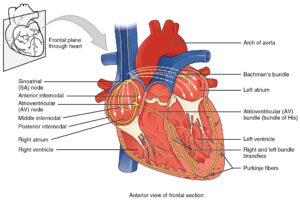When your heart isn’t beating as it should, a pacemaker can be your life-changing solution. In this blog, Dr Malik explains what heart conditions require a pacemaker, how they affect your heart, and why early detection is key. Whether you’re experiencing unexplained tiredness or episodes of dizziness, understanding these conditions can help you make informed decisions about your health.
What is a Pacemaker?
A pacemaker, a cardiac pacing device, is a small electronic device implanted in your body to help regulate an abnormal heartbeat. After a pacemaker surgery, it sends electrical pulses to your heart, ensuring it beats regularly and appropriately. A pacemaker is used for conditions where the heart’s natural rhythm is disrupted.
A permanent pacemaker is fitted with a battery and an electrical generator connected to electrical leads which are usually placed into the right ventricle (the main pumping chamber) and right atrium (the priming chamber). Modern pacemakers can even detect increased physical activity and adjust the heart rate accordingly, ensuring your heart works naturally and physiologically.
Book an appointment now to discuss whether a pacemaker is right for you.
Below, you will find a diagram of the heart’s electrical conduction system:
What Heart Conditions Require a Pacemaker
When it comes to heart rhythm disorders, there are several key conditions where a pacemaker may be recommended. Below, we explain the primary heart conditions that require a pacemaker, why they occur, and the symptoms you might experience.
Sick Sinus Syndrome
In sick sinus syndrome, the heart’s natural pacemaker (the SA node) doesn’t function properly. This can cause an abnormally slow heart rate (bradycardia), an unusually fast rate (tachycardia), or even alternating rhythms.
Symptoms include:
- Fatigue
- Dizziness or lightheadedness
- Fainting or near-fainting episodes
- Shortness of breath
- Irregular or fluttering heartbeats (palpitations)
Most cases are related to ageing, as the SA node tissue can become hardened and scarred over time. Certain medications, such as calcium channel blockers and beta blockers, may also trigger this condition.
Heart Block
Heart block occurs when the electrical signals travelling from the atria to the ventricles are delayed or interrupted. This “heart block” can be caused by age-related degeneration, damage from heart disease, or even congenital defects in some cases.
Key symptoms include:
- Lightheadedness
- Fainting episodes
- An overall slow pulse
If these symptoms become troublesome, a pacemaker is often recommended to maintain a regular heartbeat.
Atrial Fibrillation with Bradycardia
Atrial fibrillation (AF) usually causes a fast and irregular heartbeat. However, in some cases, the heart rate may slow down significantly due to the condition or its treatment (bradycardia).
In these situations, a pacemaker can ensure that your heart doesn’t drop below a safe rate, helping to prevent symptoms like dizziness or fainting.
Cardioinhibitory Syncope
This condition is characterised by sudden pauses in your heart’s rhythm, which can cause brief losses of consciousness (syncope). Even a few seconds of reduced blood flow to the brain can lead to dangerous falls or injuries.
A pacemaker helps prevent these pauses, reducing the risk of fainting and its associated complications.
Heart Failure and Cardiac Dyssynchrony
While less common, some patients with advanced heart failure or inherited rhythm disorders may experience conduction disturbances where the heart’s chambers do not beat in sync.
A specialised pacemaker, often called cardiac resynchronisation therapy (CRT), can help coordinate the heart’s pumping action. This pacemaker has 3 leads, or cables. It is more complex.
What Are the Indications For a Pacemaker
Determining the indications for a pacemaker involves carefully evaluating your symptoms and diagnostic test results. Common symptoms that might need further investigation include:
- Persistent fatigue
- Dizziness or lightheadedness
- Fainting (syncope)
- Shortness of breath
- Palpitations
Diagnostic tests like electrocardiograms (ECGs) and ambulatory heart monitors are used to detect abnormal heart rhythms. Your medical history and overall risk factors also play an important role in deciding whether a pacemaker surgery is necessary.
Summary of What Heart Conditions Require a Pacemaker
In summary, a range of heart conditions, from sick sinus syndrome and heart block to atrial fibrillation with bradycardia and cardioinhibitory syncope, can mean that your heart isn’t beating as it should. Early detection and proper management are important, as pacemaker surgery can help restore a regular, healthy rhythm and prevent further complications.
If you’re experiencing symptoms or have concerns about your heart rhythm, don’t wait. Book an appointment today with Dr Malik to discuss whether a pacemaker is right for you.
Article by Dr Malik, a leading UK cardiologist. He works at One Welbeck Heart Health – London’s Largest Private Cardiology Group, and at Hammersmith Hospital, Imperial College Healthcare NHS Trust, London, one of the largest NHS Trusts in the UK.




